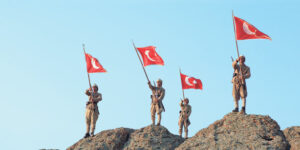With a large number of films on Turkey’s Battle of Çanakkale coming out this year — for some odd reason that still escapes me — director Yeşim Sezgin’s newest “Çanakkale 1915” might actually outdo Sinan Çetin’s “Çanakkale Çocukları” in terms of its aggression, opportunism and crooked reductionism.
 Honestly, when did everyone become so patriotic and ready to provoke the masses into absolutist valor?
Honestly, when did everyone become so patriotic and ready to provoke the masses into absolutist valor?If you’re wondering whether there is a narrative to this 128-minute-long pastiche of historical sketches that have been directly transported from a high school textbook word by word, you are very mistaken. For there are no individuals in this story, no characters, no plot points and no valid complex human emotions. The only valid emotion here is a larger-than-life calling for sacrifice and protecting the country.
Surely, this is initially understandable, since the 1914-1915 Battle of Çanakkale was a historic landmark for the Turkish nation; it was a period when the origins of the Turkish Republic were being formed from the ashes of the Ottoman Empire, thanks to the rising leadership of Mustafa Kemal, and there was a collective feeling of defending national soil against imperialistic invasion.
The real question is, whether these concerns still pertain today. And if this nationalism does apply today with its new context, what does this mean for the modern Turkish Republic, which is evolving into an economically strong, authoritarian country in which individual thought and alternative ideas are being banged down with a truncheon at the speed of lighting.
Thus is it a surprise, really, that in this film individualism and character are being nullified for the sake of the greater good (acceptable for that specific period), and that this film is being shot today in an environment where we are constantly told to shut our mouths for another kind of “greater good”? And yet what “greater good” are we talking about today? Defending the country against evil invaders?
What is so sloppy about this film is that in my opinion it exploits a kind of patriotism that was necessary for 1915 and slyly transforms it into an atrocity of jingoism and absolutism while intentionally or unintentionally manipulating its Turkish audience.
So let’s take a look at the film. It all starts with the end of the Balkan Wars, when the Ottoman Empire lost its land in the Balkans to rising nationalism, initiated with the provocation of the Allied Forces. However, this surge of nationalism has also taken over Anatolia, as the destitute population felt that it was time to protect the land that was in the process of being invaded as well. We meet the soldiers sent to Gallipoli to defend the Dardanelles against Allied ships. Unfortunately, the Ottoman army is no match for the opposing army in terms of weaponry and number of soldiers. But the Turks have something else that the allies do not have (keep in mind that the rare scenes in which we see English soldiers look like they have popped out of Austin Powers sequences with Dr. Evil) — the Turks have faith, and they love their country, their land is rightfully too precious to give up.
We watch numerous sketches and sequences of soldiers making immense sacrifices for their country in order to win the battle. In fact it is these sacrifices that solely define these soldiers, along with their idealistic patriotism, purity and religious belief that God is on their side.
What is so frustrating is that some scenes are so blatantly full of improbable valor that they border on the comical because the filmmakers have taken themselves too seriously as they leave behind any kind of introspection.
Honestly, I really wanted to believe; I really wanted to be proud of my country, I really wanted this film to respect all the soldiers as unique individuals who did indeed give up their precious lives to protect their country; I wanted to believe that they did not sacrifice themselves for nothing. But this film is devoid of any decent value for human life; it is more of a propaganda tool for militarism and aggressive nationalism. Was it not the value for human life and freedom that we fought for in the first place? How can we be convinced that this was the ultimate cause when we can’t even genuinely see it on the screen?
I sadly apologize to the makers of this film for not being convinced.
‘Çanakkale 1915’
Directed by: Yeşim Sezgin
Country: Turkey
Genre: drama / history
Cast: Şevket Çoruh, Barış Çakmak, Serkan Acar, Rıza Akın
(Today’s Zaman)















